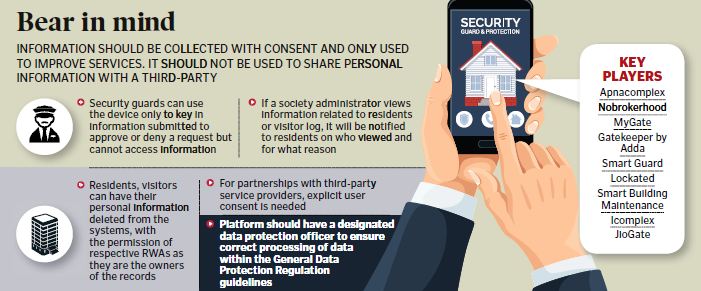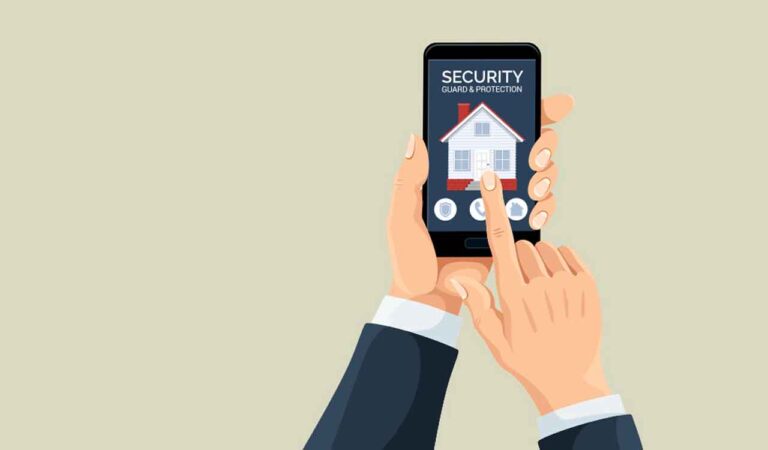Apartment security management apps face challenges when trying different concepts to stay afloat.
Post Date – 11:30 PM, Saturday – 11/26/22

Representative images.
Hyderabad: The lockdown comes as the apartment security agency scans every visitor (if any) not only for identification, but also for high temperatures and any signs of illness. Meanwhile, apartment visitor management apps have become popular.
Now, as the situation eases, the apps face challenges trying out different concepts to stay afloat. From ads and offers to upgrades to premium plans, from free plans to marketing campaigns, the activities of some of these apps have also been called into question over privacy concerns.
“Some service providers are partnering with other startups that offer other services. Someone else invests in a community access management service player, what do you get? Obviously data access. Once they become partners, they will share data with each other. Although there will be Some overlapping customers, but there is still room to find new customers. This issue has been flagged,” said an industry representative.
Meanwhile, apartment management solutions provider MyGate has raised Rs 100 crore in a new funding round co-led by Urban Company and Acko, according to reports. The company is valued at around Rs 1,700 crore or $210 million (after distribution). Urban Company and Acko now hold a 2.95% stake in the company. Earlier this month, MyGate announced a partnership with Acko and Urban Company. It said Acko would be its exclusive partner for extended protection solutions, while Urban Company would offer home services to MyGate users on the app.
Last year, MyGate announced its foray into community-wide commerce with the launch of ‘MyGate Exclusives’. In this case, it gets discounts from every purchase a resident makes. It also charges listing fees on brands. It says the platform does not allow ads and is non-intrusive.
“I keep getting messages about taxis going to the airport. It even knows if our maid or driver is on duty,” said a resident of a gated community in Hyderabad.
The apps also push users to upgrade to paid plans.
“You are currently on the free plan. Your society is on the ‘free plan.’ Upgrade to premium for an ad-free experience,” said a message sent to residents by such a visitor management platform. The gated community has also placed a large screen in a favorable position to show some “related” advertisements in the gated community.
Advertisements on bulletin boards come from signs offering faster broadband connections, banking services offering insurance, and shoe signs offering slippers comfortable to wear in less comfortable places. Apartment maintenance alerts advertised: “Say goodbye to your taxi hassle and hello to reliable, affordable airport taxis!” One company offers smart RO units for $375/month, while a competitor sells them for $375/month It offers a similar product for Rs 339.
In another example, a visitor to an upscale residential property in Hitec City was asked to enter a mobile phone number. Since then, there’s been a flurry of ads renting space on his phone’s screen.
V Rajashekar Reddy, secretary-general of industry body Credai Hyderabad, said the ad or no ad came down to the arrangement of the resident welfare association/association with the app provider. “Some companies have signed a revenue-sharing agreement with software service providers. In this case, various promotional activities will be held in the apartment. The income of participating players is shared with the society,” he said.
However, having a visitor management solution (even with an ad) is better than nothing, as it can help keep your home safe, create a communication channel about social events, and keep intruders or unwanted guests out of your home. “Visitor management solutions have become popular since Covid. These models are still evolving. Today, resident welfare associations are calling for what services to choose,” he said.
What do these apps do?
They primarily improve security processes, manage visitors, handle e-commerce deliveries, and generate access cards and parking tickets. They also act as “community management” platforms, providing users with real-time information and alerts. Some have password-based visitor management, home help management, electronic intercoms that convert smartphones into intercom devices, and text-based panic alert systems. They also remotely manage security personnel, vehicles, and issue notifications on emergencies. They prevent unsolicited vehicle parking in gated communities. Some send weekly email reports to administrators. If residents are waiting for visitors or deliveries, they can notify security.
“We opted for a paid service. There are no ads. The app is a useful tool for communicating social events, managing public property, and renting out banquet halls and other facilities,” said the secretary of one gated community.
Akhil Gupta, co-founder and CTO of Nobroker.com, who launched the Nobrokerhood app, said: “We are like a store with a wide range of products, but we don’t bombard residents with ads. Value. If residents see value, they will pay for the service. We don’t have to send push ads. We don’t have any subscription plans.”
The community management company lists many services on its platform, such as house cleaning, packing, plumbing, painting, taxi service, and more. These are all potential revenue streams.
“When a customer chooses a service, we tell the customer that their mobile number will be shared with the person providing the service. If they don’t accept the shared number, we won’t process the transaction,” he said of the need for consent from residents .
Society needs money to manage property effectively. This is where the revenue-sharing model comes into play. “We share the company’s proposals with the community. They provide these companies with physical space to host events and banquets. The money earned this way reduces the cost of common area overhead,” Gupta added, adding that not all residents Agree with the income channel point.
Why do you need a mobile number?
The mobile phone number has come in handy when tracking people affected by COVID-19. Gupta explained the role of visitor management platforms during Covid to determine whether a person has visited campus and minimize exposure to superspreaders.

